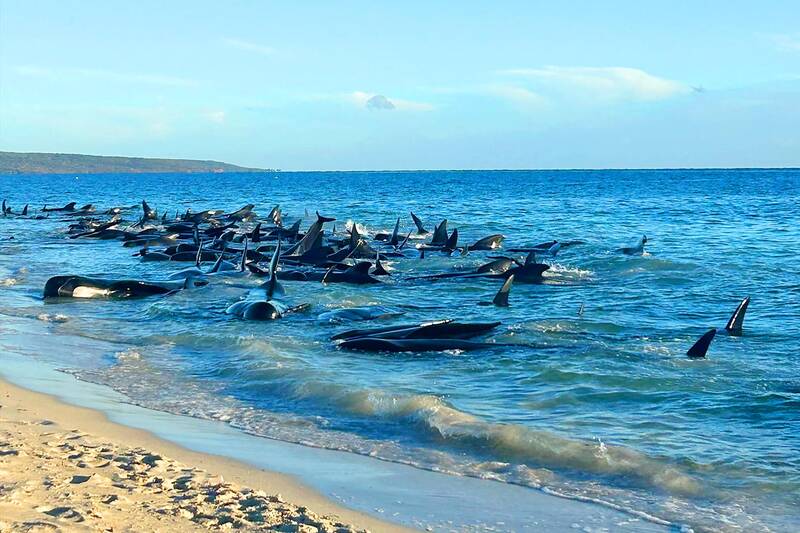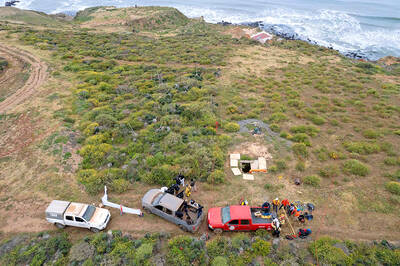More than 100 long-finned pilot whales that beached on the western Australian coast on Thursday have returned to sea, while 29 died on the shore, officials said.
Ships and a spotter plane were monitoring the rescued whales in case they returned to shore, Western Australia Parks and Wildlife Service officer Pia Courtis said.
“So far so good, they haven’t made it back to shore, but we will keep monitoring them,” Courtis told reporters.

Photo: AFP, Western Australia Department of Biodiversity, Conservation and Attractions
Local whale researcher Ian Wiese joined hundreds of volunteers who helped rescue the whales at Toby’s Inlet near Dunsborough.
“When I first arrived, there was, I think, 160 in the water — almost out of the water — and there were a couple of hundred people who were with the whales, they were trying to comfort them and make sure that their heads were out of the water so they could breathe. And then after an hour or so, all of a sudden the ones that were in the water that were still alive left and went out to sea,” Wiese said.
“They may well decide to come back to shore somewhere on another beach nearby or something — that often happens, but we’re hopeful that they won’t,” Wiese added.
A team of wildlife officers, marine scientists and veterinarians had earlier reached the scene and reported 26 dead among up to 160 stranded.
Wiese said he earlier thought 31 whales had died, but the Western Australia Department of Biodiversity, Conservation and Attractions later said the final death toll was 29.
In July last year, about 100 long-finned pilot whales died or were euthanized after a two-day rescue attempt in a mass stranding on Cheynes Beach near Albany, 355km southeast of Dunsborough.
Dunsborough is 285km by road south of Perth, Western Australia state’s capital and largest city.
Based on previous strandings, including the Cheynes Beach incident last year, euthanizing the beached whales is usually the most humane outcome, the department said in a statement.
“We always hope for the best outcome,” it added.
Wiese said that Thursday was the third mass stranding he had responded to and the result was by far the best.
“It’s been a very good story today because normally with these sorts of strandings, you wind up with a 100 whales beaching and five or six being saved,” Wiese said.
The whales were believed to have become stranded early on Thursday, Courtis said.
The dead whales were dragged from the water so that their carcasses did not attract sharks.
Marine scientist Holly Raudino said tissue samples had been taken from the dead whales to exclude potential causes of the stranding, in particular infectious disease.
Dunsborough was the scene of a mass stranding of 320 long-finned pilot whales in 1996. Only 20 died on that occasion, with rescuers returning the rest to sea.
Scientists do not know what causes whales to strand, although it appears their location systems can be confused by gently sloping, sandy beaches.
Theories include that they are avoiding predators such as killer whales, or following a sick leader ashore. Human-made undersea noise could also interfere with their navigation.

With the midday sun blazing, an experimental orange and white F-16 fighter jet launched with a familiar roar that is a hallmark of US airpower, but the aerial combat that followed was unlike any other: This F-16 was controlled by artificial intelligence (AI), not a human pilot, and riding in the front seat was US Secretary of the Air Force Frank Kendall. AI marks one of the biggest advances in military aviation since the introduction of stealth in the early 1990s, and the US Air Force has aggressively leaned in. Even though the technology is not fully developed, the service is planning

INTERNATIONAL PROBE: Australian and US authorities were helping coordinate the investigation of the case, which follows the 2015 murder of Australian surfers in Mexico Three bodies were found in Mexico’s Baja California state, the FBI said on Friday, days after two Australians and an American went missing during a surfing trip in an area hit by cartel violence. Authorities used a pulley system to hoist what appeared to be lifeless bodies covered in mud from a shaft on a cliff high above the Pacific. “We confirm there were three individuals found deceased in Santo Tomas, Baja California,” a statement from the FBI’s office in San Diego, California, said without providing the identities of the victims. Australian brothers Jake and Callum Robinson and their American friend Jack Carter

Le Tuan Binh keeps his Moroccan soldier father’s tombstone at his village home north of Hanoi, a treasured reminder of a man whose community in Vietnam has been largely forgotten. Mzid Ben Ali, or “Mohammed” as Binh calls him, was one of tens of thousands of North Africans who served in the French army as it battled to maintain its colonial rule of Indochina. He fought for France against the Viet Minh independence movement in the 1950s, before leaving the military — as either a defector or a captive — and making a life for himself in Vietnam. “It’s very emotional for me,”

The Chinese Communist Party’s (CCP) Central Committee is to gather in July for a key meeting known as a plenum, the third since the body of elite decisionmakers was elected in 2022, focusing on reforms amid “challenges” at home and complexities broad. Plenums are important events on China’s political calendar that require the attendance of all of the Central Committee, comprising 205 members and 171 alternate members with Chinese President Xi Jinping (習近平) at the helm. The Central Committee typically holds seven plenums between party congresses, which are held once every five years. The current central committee members were elected at the